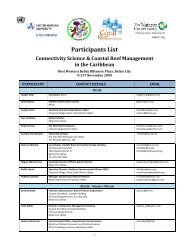The Global Water Crisis: Addressing an Urgent Security - Unu-inweh ...
The Global Water Crisis: Addressing an Urgent Security - Unu-inweh ...
The Global Water Crisis: Addressing an Urgent Security - Unu-inweh ...
Create successful ePaper yourself
Turn your PDF publications into a flip-book with our unique Google optimized e-Paper software.
Other non-governmental collaborations, such as <strong>The</strong> Blue Economy Initiative in C<strong>an</strong>ada, are national in scope. <strong>The</strong> Blue<br />
Economy Initiative is a project founded by the Royal B<strong>an</strong>k of C<strong>an</strong>ada, the C<strong>an</strong>adi<strong>an</strong> <strong>Water</strong> Network <strong>an</strong>d the Walter <strong>an</strong>d<br />
Dunc<strong>an</strong> Gordon Foundation. <strong>The</strong> initiative seeks to catalyze C<strong>an</strong>adi<strong>an</strong> leadership in the Blue Economy by illuminating<br />
the economic benefits of sustainable water m<strong>an</strong>agement, including risk avoid<strong>an</strong>ce, improvements to efficiency <strong>an</strong>d<br />
productivity, <strong>an</strong>d the employment <strong>an</strong>d economic opportunities arising from innovation in the water sector (Blue Economy<br />
Initiative, 2011).<br />
3.4. Investors<br />
One sign that the Blue Economy is beginning to materialize is the growth of venture capital investment. According to Lux<br />
Research, 2007 was water’s breakout year as a venture investment category, with 59% of the US $1.12 billion invested in<br />
water by venture capitalists coming after this date (Lux Research, 2008). Some venture capital firms, such as XPV Capital,<br />
based in C<strong>an</strong>ada, have developed portfolios entirely around the water opportunity. Yet when compared to the broader<br />
cle<strong>an</strong>-tech sector, water still garners a relatively modest share, only about 3% of total cle<strong>an</strong>-tech venture investments<br />
(Cle<strong>an</strong>tech Group, 2011). Further investment is likely being slowed by concerns about when to market, slow adoption<br />
processes, uncertain regulatory environments, <strong>an</strong>d the threat of large competitors (Cle<strong>an</strong>tech Group, 2011).<br />
4. Key Principles for the Blue Economy<br />
To close the growing gap between global water supply <strong>an</strong>d dem<strong>an</strong>d, innovations like those mentioned above will need to<br />
become increasingly mainstream. For this to happen, successful players in the Blue Economy will be those governments,<br />
businesses, org<strong>an</strong>isations <strong>an</strong>d partnerships that heed the following key principles:<br />
• Knowing <strong>an</strong>d underst<strong>an</strong>ding the value of water. <strong>The</strong> world has entered a knowledge-based economy, but m<strong>an</strong>y<br />
gaps still remain in most countries’ basic underst<strong>an</strong>ding of water. <strong>The</strong> starting point needs to be the creation of<br />
detailed water accounts that track water systems – rivers, lakes, <strong>an</strong>d aquifers – within a country, including which<br />
ones are stressed, how much water is being withdrawn <strong>an</strong>d by whom, which are the dependent ecosystems,<br />
<strong>an</strong>d what the requirements are for sustainability. <strong>The</strong>se accounts need to reflect water’s m<strong>an</strong>y values, including<br />
non-market environmental <strong>an</strong>d social benefits, <strong>an</strong>d be incorporated into a full cost pricing of water for all water<br />
use sectors.<br />
• Adhering to a conservation ethic that underpins the Blue Economy. Augmenting the current global water supply<br />
will not close the growing gap between supply <strong>an</strong>d dem<strong>an</strong>d. Boosting water efficiency <strong>an</strong>d focusing on re-use,<br />
recycling <strong>an</strong>d supporting green infrastructure should be the bedrock for the Blue Economy. Increasing water<br />
productivity in agriculture will be a fundamental part of the solution as farmers use more th<strong>an</strong> 70% of current<br />
global water withdrawals.<br />
• Getting the public on board. With the exception of countries facing severe water scarcity, the general public has<br />
continued to believe that fresh water is abund<strong>an</strong>t. In order to create a public <strong>an</strong>d political appetite for innovation<br />
<strong>an</strong>d new approaches, this myth has to be broken. Governments, non-governmental groups <strong>an</strong>d businesses should<br />
work together to raise the water literacy of their citizenry.<br />
• No one c<strong>an</strong> do it alone. To date, the brightest innovations have involved active collaboration between governments,<br />
the private sector, research institutions, non-profit org<strong>an</strong>izations <strong>an</strong>d communities. Making progress on the Blue<br />
Economy requires these creative partnerships to bring together diverse knowledge <strong>an</strong>d expertise necessary to<br />
address increasingly challenging water issues.<br />
• It’s about people, not technology. <strong>The</strong> most innovative water technologies will have no value unless the hum<strong>an</strong><br />
capacity exists to install, operate <strong>an</strong>d m<strong>an</strong>age them. Moreover, much of the innovation required to stimulate<br />
appropriate water solutions will need to come from the people designing the govern<strong>an</strong>ce frameworks that embed<br />
policies, pricing structures, new institutions <strong>an</strong>d incentive programmes to support the Blue Economy.<br />
64 <strong>The</strong> <strong>Global</strong> <strong>Water</strong> <strong>Crisis</strong>: <strong>Addressing</strong> <strong>an</strong> <strong>Urgent</strong> <strong>Security</strong> Issue




